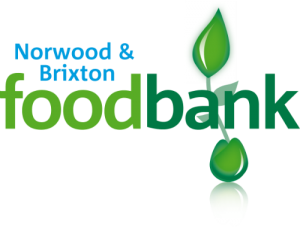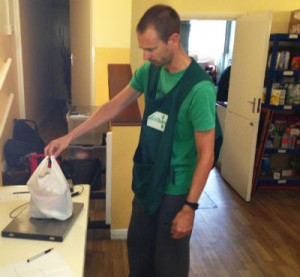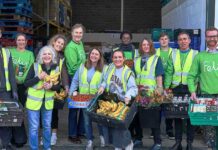Shelley Phelps heads down to Brixton Food Bank to meet some of its dependents and volunteers.

It is ten to eleven on Saturday morning and there is already a queue of people waiting outside the Brixton and Norwood Food Bank at St Paul’s Church, Ferndale Road.
It is run by the Trussell Trust, a Christian charity that helps to tackle poverty and exclusion in the UK. The Trust works with churches and communities to run a network of over 370 food banks nationwide.
I came down to help out and in the process got talking to some of the people using the food bank, as well as its volunteers.
Serena from Brixton is 16 and at the food bank collecting shopping on behalf of her mother. “She can’t come right now. She’s at home looking after my little brother who’s not well,” she explains.
Serena tells me her family have had to use the food bank five times recently. Her mother is on full-time benefits. She used to work but gave up when her younger brother, now four, was born.
Her mother’s money does not go far enough with rent and bills to pay she explains. And then there is the crisis loan that she is paying back, which she took out at Christmas.
Serena is due to start a course in hair and beauty at Clapham College at the end of summer. Her mother is struggling at the moment because she has had her benefits removed for Serena, who left secondary school in July and is therefore not currently in full-time education.
“We can’t give the benefit agency proof I’m going to college until I get there in September. But when they get it they will give mum her benefits back,” she explains hopefully. She says that the family were managing to get by before this.
Serena’s younger brother is ill at the moment. “When he eats, he’ll be sick. But he still has to eat to line his stomach, so my mum has to feed him more. She’s running out of stuff.”
A variety of factors are thought likely to have contributed to the growth in food banks: high global food prices, increased unemployment, earnings growth at less than the rate of inflation and, whilst the number of people claiming benefits has increased, eligibility and sanctions rules have been tightened. Some commentators have speculated that the growth of food banks is due to the government’s welfare reforms but the government has refuted any link.
Deeba from Streatham is 28 and has a new baby daughter. Deeba is on Income Support and has also used the food bank before.
I ask Deeba how much she lives on a month after rent and bills.
“Thirty pounds every two weeks, sometimes my mother helps me, so under £100,” she replies.
She is in receipt of housing benefit to cover her rent, though she says she has experienced trouble claiming this since spring and payments have been irregular. She put in an application for Child Benefit in June but says she has yet to receive any money.
It is Hayleigh McCloud’s first time at the food bank. She is in receipt of disability allowance for mental health and says that she normally has enough money to get by on.
But Hayleigh tells me that last week she was attacked in Croydon town centre and had £400 stolen. She has travelled all the way from Croydon because there was not a food bank open nearby. “I don’t know what I’d do if this wasn’t here. I had no-one else to turn to.”
“I never knew places like this existed. It’s opened my eyes up to a lot,’ she adds. It’s brilliant that there are so many people here to help. I’m so grateful.”
I also got a chance to speak to Jon Taylor whilst helping in the storeroom. Jon has been volunteering at the Food bank for 18 months and heads up a team of 6-8 volunteers every third Saturday.
Jon explains the process. Registered professionals such as doctors and nurses issue food vouchers to people they deem to be in need. Then those people bring the vouchers to the food bank. The vouchers are taken into the storeroom where volunteers prepare 3-day emergency food hampers. The hampers are weighed and recorded before the food is taken out to the person in need.
There are different shopping lists for different circumstances – single adults, two adults, an adult and a child and a whole family. People are given a choice of meat, fish or vegetarian hampers. Commonly included items are pasta, rice, baked beans, tinned vegetables and tinned fruit.

The latter was running particularly low when I arrived, but then a local neighbour stopped by with a donation. Another resident had ordered a £100 food shop to be delivered to the food bank that morning.
Jon tells me that, according to the paperwork, Brixton and Norwood Food Bank has fed between 40 and 50 people today. He adds that it feeds around 150-200 people per week, and since opening in September 2011 it has fed over 5,000 people.
The food bank is entirely dependent on donations from the public, who Jon says have been very generous. The local supermarkets are also a big help and operate a scheme where they double all the food the bank receives on collection days. Plus the local churches are a key source of volunteers and donations, he adds.
“We rely on the general public to survive,” Jon says. “We often run really close to the wire, but amazingly we seem to just about get enough just in time from the members of the public.”
“On a Saturday session, as we’re giving food out people are coming in with donations. But it’s not an ideal way to run. It hasn’t happened yet but there have been times where we’ve been dangerously close to not being able to provide,” he warns.
If you are keen to find out more, including volunteering and donation points, click here.
Note: Some names are fictitious to protect the identity of the individuals.



